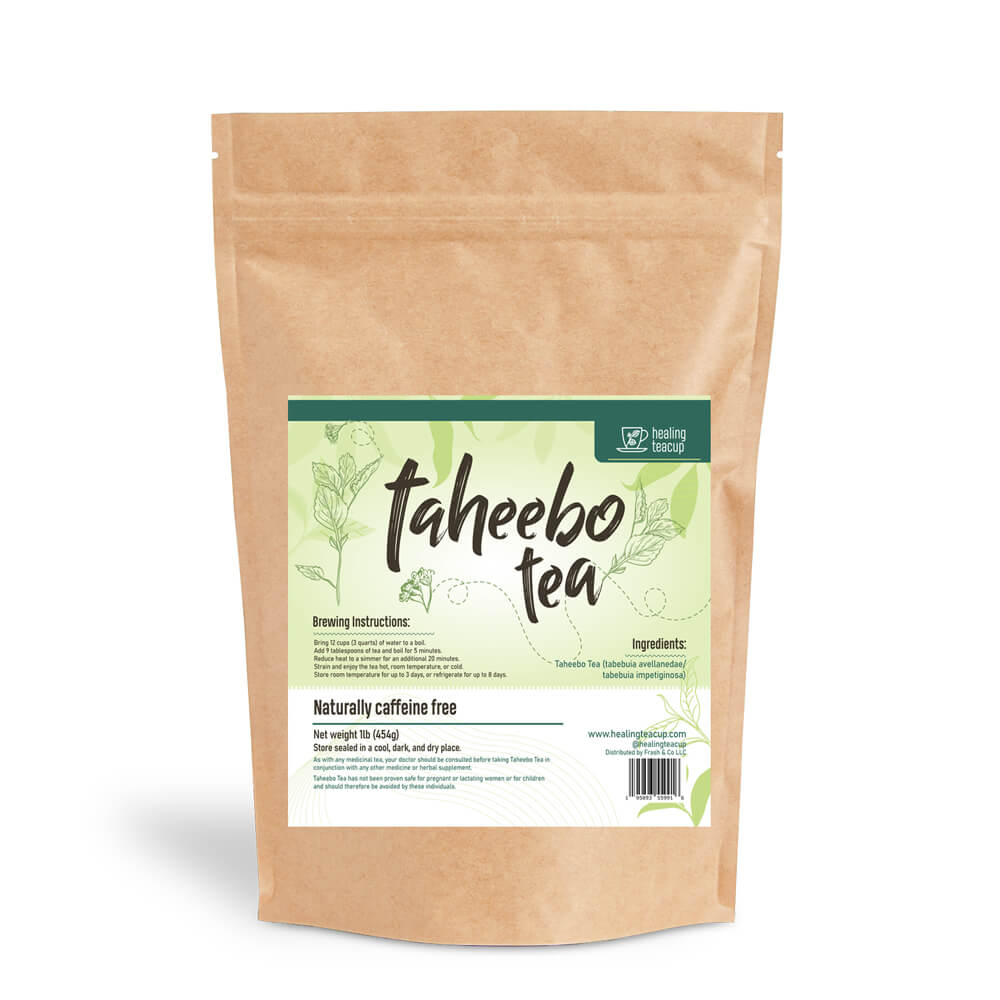Investigating natural remedies for cancer brings many to Taheebo tea, also known as Pau D'Arco tea, a brew with deep-rooted traditional use. But what does science say? This article explores the link between Taheebo tea and cancer, including the latest research, potential benefits, and necessary precautions, helping readers to discern fact from folklore.
Key Takeaways
- Taheebo tea, made from the inner bark of Tabebuia trees in South America, has been traditionally used for its healing properties including anticancer benefits. However, it requires further scientific research to substantiate these claims.
- The active compounds in Taheebo tea, such as Lapachol and Beta-Lapachone, have shown potential anticancer effects in in vitro and animal studies, suggesting possible benefits in inhibiting cancer cell growth and inducing apoptosis.
- While Taheebo tea might offer complementary therapeutic benefits for cancer patients, it also presents potential side effects and may interact with cancer treatments; thus, it is crucial to consult healthcare professionals before integrating it into treatment regimens.
|
In This Article: |
Taheebo Tea: Origins and Traditional Uses

At the heart of Taheebo tea lies the Pau D'Arco tree, a broadleaf evergreen that can reach a height of 125 feet. This towering tree, native to Central and South America, not only boasts pink-to-violet colored flowers but also houses the precious ingredient for our tea - its inner bark.
To extract the healing essence of Taheebo tea, the inner bark of the Pau D'Arco tree is harvested. It’s this inner bark that houses the active compounds responsible for the potential health benefits of the tea. Among the Pau D'Arco tree species, Tabebuia Avellanedae and Tabebuia Impetiginosa are primarily used for this purpose. The inner bark is brewed as a decoction to create the beneficial Taheebo tea.
Traditional Medicinal Uses
Local communities have used the healing properties of Taheebo tea for centuries to address a wide array of health conditions. Historically, Taheebo tea has been recognized for many therapeutic benefits:
- Immune System Booster: One of the most acclaimed benefits is its ability to strengthen the immune system. The compounds found in the tea, including lapachol and beta-lapachone, have been observed to enhance the body's natural defenses against infections and diseases.
- Anti-Inflammatory Effects: Taheebo tea is renowned for its anti-inflammatory properties. It has been traditionally used to alleviate symptoms of arthritis, reduce inflammation in various bodily systems, and soothe inflammatory diseases.
- Antifungal and Antibacterial: The bark of the Taheebo tree contains potent antifungal and antibacterial properties, making the tea an effective remedy against infections like Candida overgrowth, bacterial infections, and even certain sexually transmitted diseases.
- Cancer and Leukemia: Though still requiring more scientific validation, Taheebo tea has been used traditionally in the fight against cancer and leukemia. Its active ingredients are believed to inhibit the growth of cancer cells and support traditional cancer treatments.
- Digestive Health: The natural laxative effect of the tea aids in digestion, helping to relieve constipation, improve nutrient uptake, and prevent gut infections.
- Pain Relief: Traditionally, Taheebo tea has been used to alleviate pain, ranging from minor aches to more severe pain associated with health conditions.
Despite its ancient roots, Taheebo tea continues to be relevant in modern herbal medicine. Its integration into contemporary health practices speaks volumes about its effectiveness and enduring popularity. It's important to note that additional scientific research is required to substantiate these health benefits.
Active Compounds in Taheebo Tea
Now, we shift our focus to the core of Taheebo tea - its active compounds. The key active compounds found in Taheebo tea are lapachol and beta-lapachone. These compounds not only lend the tea its distinctive flavor but also contribute to its potential health benefits.
Significantly, Lapachol is associated with potential benefits like vivo anti-inflammatory effects, immune function enhancement, inflammation reduction, bacterial and viral infection combat, and decreased risk of certain cancers.
On the other hand, Beta-Lapachone has demonstrated anti-proliferative effects on various cancers, further enhancing the potential medicinal properties of Taheebo tea.
Lapachol
Lapachol, with the chemical composition of C15H14O3, is a primary active compound in Taheebo tea.
Its anticancer activity has been observed in in vitro studies on leukemia, sarcoma, and Walker 256 carcinoma cells. While these findings are compelling, additional research is needed to fully understand the therapeutic potential of Lapachol and its mechanisms in the human body.
Beta-Lapachone
Another key player in Taheebo tea’s therapeutic potential is Beta-Lapachone. Like Lapachol, Beta-Lapachone shares the same molecular formula, C15H14O3.
Beta-Lapachone has demonstrated activity against a range of cancer types in laboratory studies, including:
- Hepatocellular carcinoma
- Breast cancer
- Prostate cancer
- Lung cancer
- Pancreatic cancer
- Yoshida sarcoma
- Walker 256 carcinoma cells
- Rauscher leukemia
It exhibits its anticancer activity against human malignant melanoma cells by continuously producing reactive oxygen species, facilitated by NAD(P)H: quinone oxidoreductase 1 (NQO1), a key enzyme involved in gene expression, as studied by the National Cancer Institute.
Taheebo Tea and Cancer Research
Cancer research has been progressively shining a spotlight on Taheebo tea. In vitro studies have demonstrated that Taheebo tea exhibits antioxidant capacity, inhibits cancer cell growth, and showcases potential anticancer properties, including the inhibition of colony formation and cell migration.
Additionally, animal model research has shown promising results, with Taheebo tea exhibiting anti-cancer activity, suggesting its potential advantages in combating cancer in more intricate biological systems beyond cell cultures.
Despite these encouraging findings, human clinical trials are relatively limited. While several studies have examined the effects of Taheebo extract, indicating its potential anti-cancer properties, further human clinical trials are necessary to validate these results.
In Vitro Studies
In vitro studies provide an insightful glimpse into the potential of Taheebo tea. It has demonstrated notable antibacterial properties, including against Helicobacter pylori, a bacterium linked to stomach ulcers and even stomach cancer, as well as human intestinal bacteria.
Moreover, Taheebo tea has shown anti-inflammatory properties in these studies, effectively attenuating inflammation and modulating macrophage-mediated responses. These findings suggest that Taheebo tea could potentially play a role in managing inflammatory conditions, including those associated with cancer.
Animal Models
Stepping beyond cell cultures, animal model studies have further illustrated the potential benefits of Taheebo tea. One key finding is its ability to enhance endurance capacity by increasing skeletal muscle glycogen levels and regulating blood glucose.
Moreover, extracts of the tea have shown potential in inhibiting the growth of human cancer cells and promoting apoptosis in vitro, as well as inhibiting colony formation and cell migration in animal models. These promising results suggest a possible role for Taheebo tea as an anticancer agent, warranting further exploration.
Potential Side Effects and Precautions
While the potential benefits of Taheebo tea stimulate interest, awareness of potential side effects and precautions is equally important. Some adverse reactions may include:
- stomachache
- diarrhea
- nausea
- vomiting
- mild dizziness
- allergic responses (in rare instances)
It is vitally important to monitor your body’s reactions and adjust your consumption as needed.
Interactions with Cancer Treatments
The interplay between Taheebo tea and cancer treatments is a significant factor to consider. Taheebo tea has the potential to increase the risk of abnormal bleeding and bruising when combined with specific medications, and it may also hinder the blood’s clotting ability, which could impact blood-thinning drugs.
Moreover, Taheebo tea’s antioxidant properties may potentially interfere with the efficacy of conventional cancer treatments like chemotherapy and radiation therapy, as they might counteract the free radicals that these treatments depend on. Hence, it’s essential to consult with healthcare professionals before incorporating Taheebo tea as a complementary therapy.
Taheebo Tea as a Complementary Therapy

With a rich historical background and encouraging research findings, Taheebo tea presents potential advantages as a supplementary therapy for cancer patients. However, while initial research suggests that Taheebo tea extract may have anti-cancer and anti-inflammatory properties, further research is needed to establish its safety and effectiveness.
It’s also worth noting that there is no clinical information available to define a specific dosage for Taheebo tea as a complementary therapy. Therefore, it’s recommended to start with one cup per day and adjust as needed, in consultation with a healthcare professional.
Potential Benefits
From the laboratory to the teapot, Taheebo tea has shown promise in various aspects. It has demonstrated the ability to:
- Inhibit cancer growth through a variety of mechanisms, showcasing growth inhibition
- Inhibit tumor formation and growth in various animal models for human cancer
- Inhibit the growth of estrogen receptor-positive human breast cancer cells
Additionally, Taheebo tea has shown the potential to enhance endurance capacity by up-regulating skeletal muscle glycogen levels and maintaining blood glucose. While these findings are compelling, it’s crucial to note that further investigation is required to comprehensively comprehend its influence on human endurance performance and cancer treatment.
Consultation with Healthcare Professionals
The potential benefits of Taheebo tea are intriguing, but the significance of professional medical advice should not be overlooked. Cancer patients need to consult with their healthcare professionals before using Taheebo tea due to the potential interaction with cancer medication and exacerbation of symptoms.
Healthcare professionals should approach advising cancer patients about Taheebo tea with careful consideration of its:
- potential benefits
- contraindications
- adverse reactions
- toxicology
- pharmacology
This consultation is a crucial step to ensure the safe and effective use of Taheebo tea as a complementary therapy.
Summary
In conclusion, Taheebo tea, with its rich traditional origins and promising research findings, holds potential as a complementary therapy for cancer treatment. The active compounds in the tea, such as lapachol and beta-lapachone, have demonstrated anti-cancer and anti-inflammatory properties. However, further studies are needed to substantiate these findings and fully comprehend the tea's potential benefits and side effects. Always remember to seek professional medical advice before using Taheebo tea, particularly for individuals diagnosed with cancer or undergoing cancer treatments.
Frequently Asked Questions
What are the benefits of drinking Taheebo tea?
Drinking Taheebo tea can offer numerous health benefits, including anti-inflammatory, antimicrobial, anticancerous, and antileukemic properties, as well as support for the immune system, circulation, and digestion. It has been used for centuries in South America for its medicinal properties.
Are the benefits of drinking Taheebo tea scientifically proven?
Yes, Taheebo has been shown to have various pharmacological activities including anti-obesity, antibacterial, antifungal, antiviral, anti-psoriatic, antioxidant, and anti-cancer activities. While it has been used as an alternative cancer treatment, there are no specific clinical studies to support a specific dose.
What are the side effects of Pau D'Arco?
It's important to consult with your healthcare provider to find the right dosage of Pau D Arco tea, as excessive intake can be dangerous. While uncommon at recommended doses, potential side effects may include anemia, nausea, diarrhea, and dizziness, with high doses possibly leading to uncontrolled bleeding and vomiting.
Can you drink too much Taheebo tea?
Yes, drinking too much Taheebo tea can cause stomachaches, diarrhea, nausea, vomiting, and mild dizziness. It can also turn urine pink. Be mindful of the dosage to avoid these side effects.
What are the traditional uses of Taheebo Tea?
Taheebo tea has been traditionally used to address various health conditions such as cancer, inflammation, oxidative stress, and obesity.

